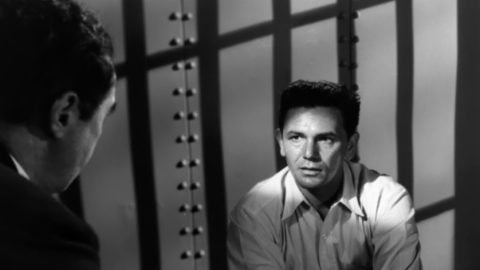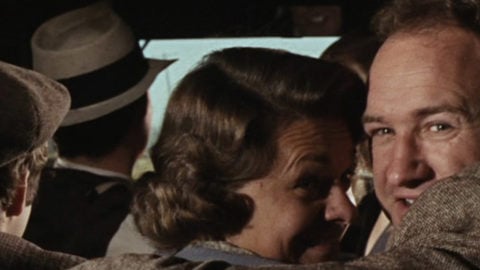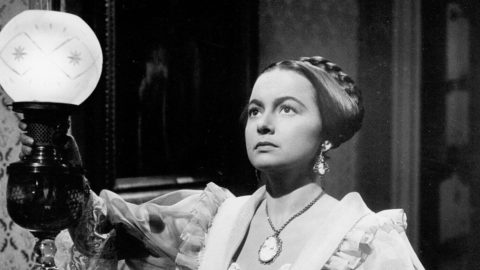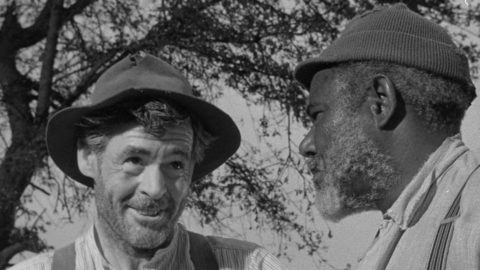TCM Diary: The Innocence of Deborah Kerr
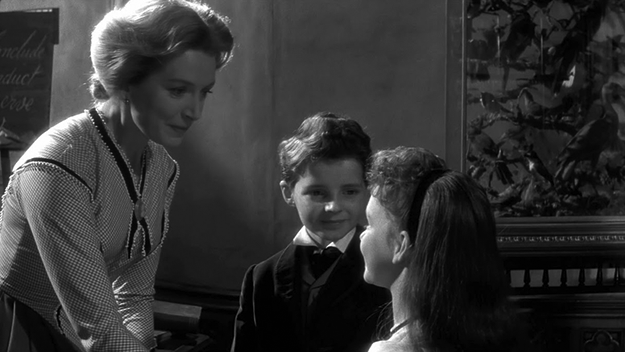
The Innocents
Deborah Kerr may have frolicked in the surf with Burt Lancaster and donned a nun’s habit more than once, but for many, her name prompts a vision of the actress in a large, gothic house, clad in a hoopskirt, tending the children of her employer. Indeed, Kerr is to governesses what John Wayne is to cowboys and Edward G. Robinson to gangsters. She played the tutor-caregiver in three of her essential films—The King and I, The Innocents, and The Chalk Garden—and mentored troubled adolescents in Tea and Sympathy and Bonjour Tristesse. Even An Affair to Remember finds her teaching music to a class of elementary schoolers.
Though Kerr’s characters sometimes have offspring of their own, from the time the actress reached her mid-thirties she tended to play lonely spinsters, widows, and miserably married women who form special bonds with young strangers in their care. Her approach is always to listen and learn—or as The King and I’s Anna tells her charges: “It’s a very ancient saying, but a true and honest thought, that if you become a teacher, by your pupils you’ll be taught.” This reciprocity (or, at worst, codependency) infuses all of her governess portrayals, and is one reason why her creations are miles apart from Julie Andrews’s impeccable Mary Poppins or concurrent TV domestics like Shirley Booth’s Hazel and Alice from The Brady Bunch: Kerr’s nannies need their children, perhaps even more than they’re needed by them.
Walking a tightrope between heightened empathy and trembling insecurity, Kerr frequently evinces a childlike air. It registers not through any juvenile trait (her voice was rich and cultivated, not breathy or babyish), nor by literal imitation like Julie Harris in The Member of the Wedding or Ginger Rogers in The Major and the Minor. Rather, the Scottish-born star reveals in her dialogue with children a longing to be useful, a sense that only in the eyes of a protégé can she perceive her own value—often with tragic consequences.
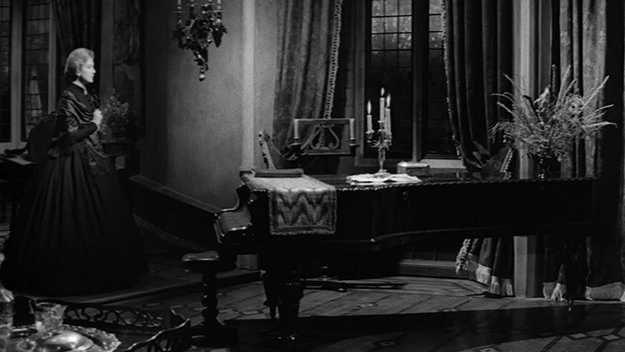
The Innocents
In Jack Clayton’s The Innocents, Kerr’s affinity for youth extends from the preternatural to the realm of the supernatural. The 1961 film, adapted for the screen by William Archibald and Truman Capote from Henry James’s novella, introduces her character, Miss Giddens, with hands clasped, intoning “more than anything I love children” in a manner that leaves little doubt of her certitude but implies that hers may not be a healthy brand of love. In a 1998 article for Film Comment, Donald Chase observed that the “lighting on her prayerfully imploring hands (and then, in an expansion of the image, on her rapt, tormented face) and the incantatory quality of her accompanying interior monologue suggest not just an obsession, but a religious quest gone crazily, destructively awry.”
Her love of children is quoted back to her by the wealthy man (Michael Redgrave) who hires Miss Giddens to oversee his orphaned niece and nephew, 8-year-old Flora (Pamela Franklin) and 10-year-old Miles (Village of the Damned’s Martin Stephens). The uncle, who appears only fleetingly and insists Miss Giddens absolve him of all responsibility, manages to charm the repressed parson’s daughter, evoking a poignant combination of desire and hero-worship (similar to that of Kerr’s sheltered lodger for David Niven in Separate Tables). Miles will later reveal himself as possessed of the same powers of flattery, skilled at manipulating the love-starved caregiver with compliments, until she suspects he’s possessed of something else altogether—the spirit of the uncle’s former valet, a licentious and domineering man whose liaison with the prior governess ended in both of their deaths.
With no finite answers from the script, Kerr builds a strong case that Miss Giddens’s sexual frustration sparks her theory that the dead servants are using Miles and Flora to continue their tryst. Her bashful glee at the mention of the uncle pales next to her growing fixation with Quint the valet. Always skilled at proffering glimpses of lurid curiosity beneath her proper decorum (and presumed altruistic motives), Kerr interrogates the housekeeper on the precise nature of Quint’s relationship with the late Miss Jessel, and with what specifically occurred in front of the children. Her zeal for learning whether their innocence was corrupted by the carnality in their midst could be masking the innocence she would deign to have corrupted in herself. In fact, her defense of the callous uncle suggests a streak of masochism that echoes her predecessor’s subjugation by Quint (“there was no cruelty she wouldn’t suffer for him”). And her belief that the siblings’ private talk is some spectral conspiracy intimates her own jealousy of the make-believe world of childhood she is barred from experiencing.
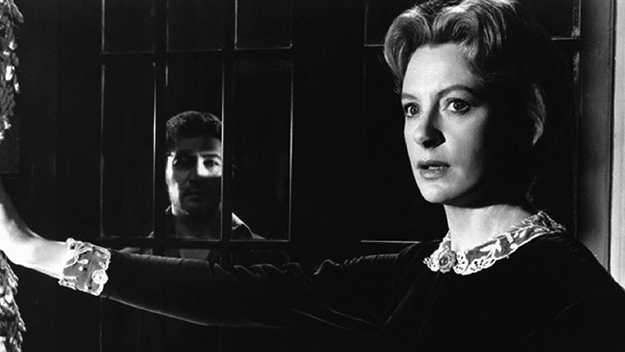
The Innocents
The Innocents is the rare ghost story in which the ghosts cause no mischief, except for the turmoil they evoke in Miss Giddens’s agitated mind. Then again, just because we see the apparitions of Quint and Miss Jessel (looking on opaquely, from a distance or behind a barrier), we can’t say for certain if they exist. “Something secret and whispery and indecent” is how she characterizes her suspicion, and Kerr inflects the line with all the qualities that comprise Miss Giddens: prurience (“secret”), immaturity (“whispery”), and puritanism (“indecent”). She oscillates between doting on the children and suspecting them of unspeakable acts, yet Kerr’s emotional transparency allows for the prospect that Miss Giddens is sane throughout—which the star herself believed.
As Chase illustrates in his Film Comment article, “Kerr blends the miniaturist nuance and affective immediacy of a consummate screen actress with the virtuosic bravura of a theatrical or operatic diva at full tilt.” This is especially true in an early scene in which, during a game of hide-and-seek with Miles, her quarry pounces on her in the attic. She seems not merely startled but deeply wounded, revealing broadly her capacity for terror but more subtly how susceptible she is to the actions of the youthful pair from whom her self-worth derives.
Color was never kinder to an actress than it was to the flame-haired Kerr, so the high-contrast black-and-white employed by Freddie Francis has an almost cruel effect. Her face is as pale as her nightgown as she creeps down the hall to investigate a nocturnal sound. Gripping a candelabra, she appears startlingly vulnerable—but not half so much as she seems in the thrall of two children a quarter of her age. (J. Lee Thompson’s occult thriller Eye of the Devil used the same configuration, but there the boy and girl are reflections of Kerr’s own innocence, and the evil and its source are never in question.)
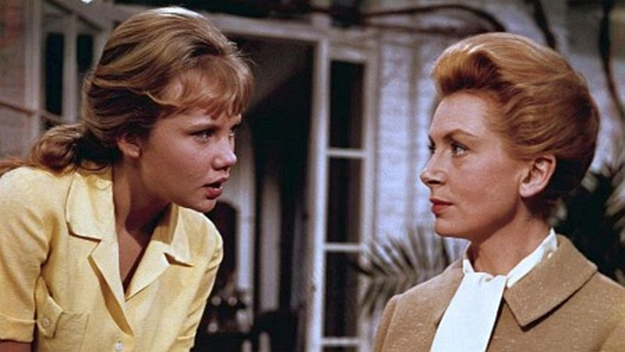
The Chalk Garden
Lines blur again in The Chalk Garden, Ronald Neame’s 1964 adaptation of Enid Bagnold’s play. Kerr is the enigmatic Miss Madrigal, who, despite her musical name, is neither expressive nor accompanied. Arriving at the home of formidable Mrs. St. Maugham (Edith Evans), Miss Madrigal brings a trunkful of new clothes, no references, and atypical shortness of temper with the adult factions of the household. Her ward is the old woman’s granddaughter, Laurel (Hayley Mills, shedding her Disney wholesomeness), an unbalanced girl with pyromaniacal tendencies whom Mrs. St. Maugham calls her “little immortality.” The new governess quickly infers that the disturbed teen, like the garden the matriarch labors to grow in chalky soil, is not getting the nourishment and care she needs.
Laurel describes herself as “a Freudian case” and soon enough Miss Madrigal unearths the cause of her transgressions: feeling spurned by her mother (whom the possessive old woman has convinced her is a reckless pleasure-seeker), Laurel yearns for maternal guidance, and delinquency brings her the discipline she craves. Such a diagnosis would seem facile were it not for the reason why it comes so easily to Miss Madrigal; suffice to say, her repeat pronouncement that Laurel reminds her of her younger self is well-founded. Her hair drawn into a Vertigo coil, Kerr in The Chalk Garden sublimates anxiety and concern into a rigid façade. Instead of signaling her understanding and compassion for the girl, she adopts the harsh persona she knows Laurel is missing in her indulgent ménage.
It’s possible that Kerr was too refined an actress to make the final revelations about Miss Madrigal’s past fully convincing, but she brilliantly suggests the cracks in her outward placidness by the way she clings to bromides like “The only hold we have on this world is the truth.” Note the quavering urgency with which she tests her own belief in the phrase as she speaks it—and then rejoins with the rashly confessional pronouncement: “The truth doesn’t always ring true in a court of law.” Kerr’s character in The Chalk Garden is a study of chaos and maturity in conflict, and for once, maturity prevails: isolating the problem at hand, she effects a solution through an act of personal sacrifice, making all of the gardens fertile again. Her vow to “continue to explore the astonishment of living” can be interpreted as a hard-won commitment to a child’s-eye view of the world. Innocence and wisdom may grow, side by side, in the same tract of soil.
The Innocents and Chalk Garden air October 15 on Turner Classic Movies.
Steven Mears received his MA in film from Columbia University, where he wrote a thesis on depictions of old age in American cinema.



